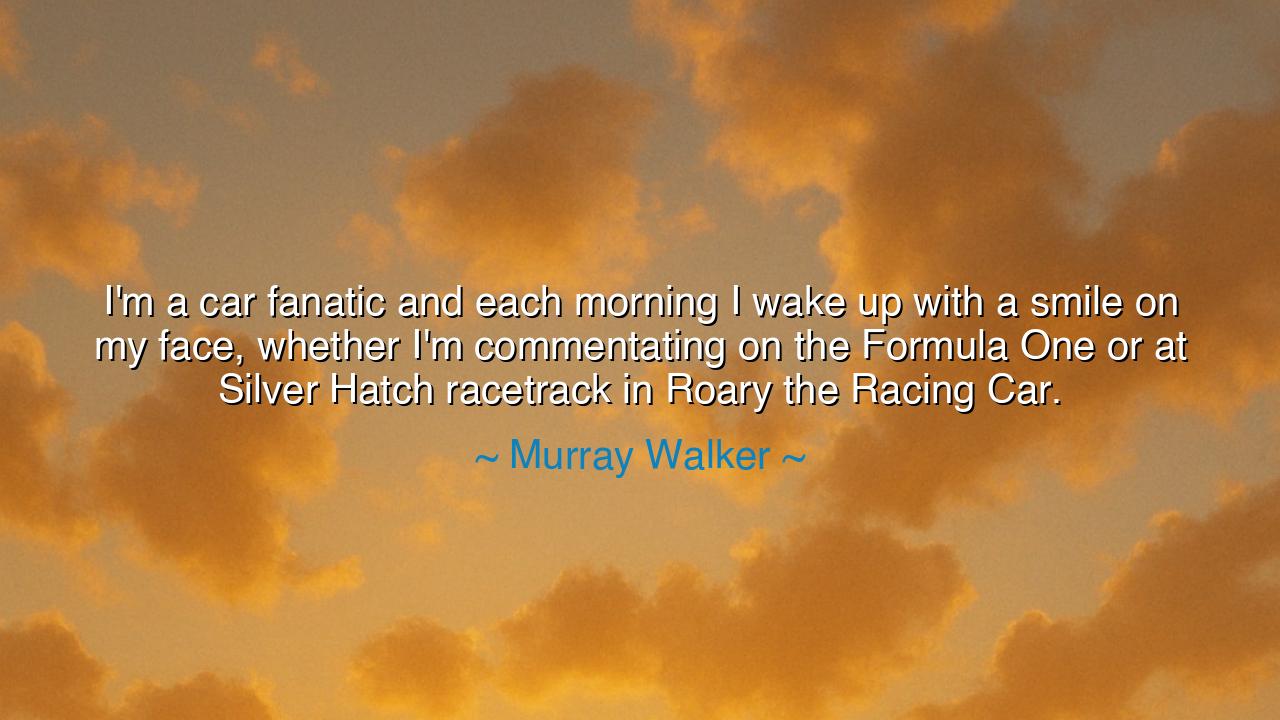
I'm a car fanatic and each morning I wake up with a smile on my
I'm a car fanatic and each morning I wake up with a smile on my face, whether I'm commentating on the Formula One or at Silver Hatch racetrack in Roary the Racing Car.






Hear now the words of Murray Walker, the voice of racing thunder, who declared with joy: “I’m a car fanatic and each morning I wake up with a smile on my face, whether I’m commentating on the Formula One or at Silver Hatch racetrack in Roary the Racing Car.” In this saying lies not only the passion of one man, but a teaching for all: that to live with zeal, to rise each day with fire in the heart and a smile upon the lips, is to live a life in harmony with one’s calling.
For Walker was no ordinary commentator—he was a herald of speed, the bard of the racetrack. His love for the car, the machine of speed and freedom, was not casual but consuming. To call oneself a fanatic is to admit to obsession, to devotion beyond reason. Yet in this devotion he found not chains but wings. Each dawn brought him joy, not dread, for his work was his delight. This is the meaning of his words: that happiness comes when passion and labor are made one.
The ancients spoke of this truth in other ways. The Greek philosopher Aristotle named it eudaimonia, the flourishing life, when a person lives according to their deepest nature and purpose. The farmer who loves the soil, the craftsman who delights in his tools, the poet who wakes to song—these are kin to Murray Walker, who lived his days among engines and roaring crowds. The smile upon his face each morning was the outward sign of inward harmony.
Consider too the long years of his service. From the dawn of television broadcasting to the twilight of his career, Walker remained ever constant, bringing energy and excitement to millions. He was known for his so-called “Murrayisms,” slips of the tongue that revealed not error but enthusiasm overflowing. Yet never did he tire, never did his passion fade. Whether describing the grandeur of Formula One or the simplicity of a children’s tale like Roary the Racing Car, he gave the same joy, the same vigor. This is the mark of one whose love is genuine: the greatness of the stage does not alter the greatness of the heart.
History shows us others who shared this spirit. Think of Michelangelo, who into his old age still declared, “Ancora imparo—I am still learning.” His obsession with art was no burden, but the source of his smile and strength. Or consider Sir Edmund Hillary, who after climbing Everest, still found joy in guiding others up smaller peaks. The lesson is the same: the one who loves their craft does not measure its size, but delights in its essence.
Thus Walker’s words remind us that passion is the true fuel of life. Without it, mornings are heavy and labor is weariness. With it, even the simplest task is radiant. To rise with a smile each day, not because of circumstance but because of calling, is a blessing greater than gold. This is the true wealth: not the trophies of racing, but the fire in the heart that greets each sunrise with joy.
Therefore, O listener, take this counsel into your own journey: find that which makes your soul ignite, that which wakes you with a smile. Do not scorn it because others call it small, nor idolize it because others call it great. Whether your racetrack is vast like the circuits of Formula One, or humble like the children’s tales of Silver Hatch, give yourself wholly to it. For in giving yourself to your passion, you will find both joy and peace.
Thus the words of Murray Walker, spoken in the language of racing, become the wisdom of the ancients: live as a fanatic for what you love, rise each day with a smile, and let your labor and joy become one. In this way, your life will roar like an engine across time, remembered not only for what you did, but for the passion with which you lived.






AAdministratorAdministrator
Welcome, honored guests. Please leave a comment, we will respond soon